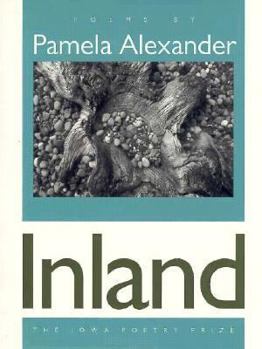Inland
Pamela Alexander's poetry is characterized by inventive language, scrupulous accuracy of imagery, and a winning fusion of the comic and the deeply serious. Her subjects vary as widely as her settings, which range from the New Hampshire woods to the Arizona desert. A family life eccentric to the point of chaos, close observations of wildlife, and coastal sailing are among the poet's topics. Despite this variety, Inland has an emerging organization that suggests a kind of plot. The family is left behind in the way that families of origin always are, revealed fully only in perspective: "foghorns / in the harbor, two different pitches / at different intervals / repeating so often I didn't hear them / and their accidental harmonies / until I'd left town." Shifting toward the subject of new relationships, in her diatribe against a past (and passing) lover Alexander gives a new twist to the fact that this subject has been fair game for poets for centuries: "...you could say hello, you canoe-footed fur-faced / musk ox, pockets full of cheese and acorns / and live fish and four-headed winds and sky..." James Merrill, praising Alexander's first book, called it "a wonderful achievement. Her language is now simple, now playful, now extremely poignant." This is an apt description of Inland as well, a book that shows Alexander in witty yet serious engagement with the world. The longest poem here, "Swallowing the Anchor" (the title is the sailors' term for giving up the sea), is also the most directly personal. It closes the section of the book in which the poet comes to terms with losses, including the death of the loved one. She does this with grace--and her wit is not jokes, her poignancy is not sentimentality.
Format:Paperback
Language:English
ISBN:0877455821
ISBN13:9780877455820
Release Date:May 1997
Publisher:University of Iowa Press
Length:80 Pages
Weight:0.30 lbs.
Dimensions:0.3" x 6.1" x 8.0"
Related Subjects
PoetryCustomer Reviews
0 rating





